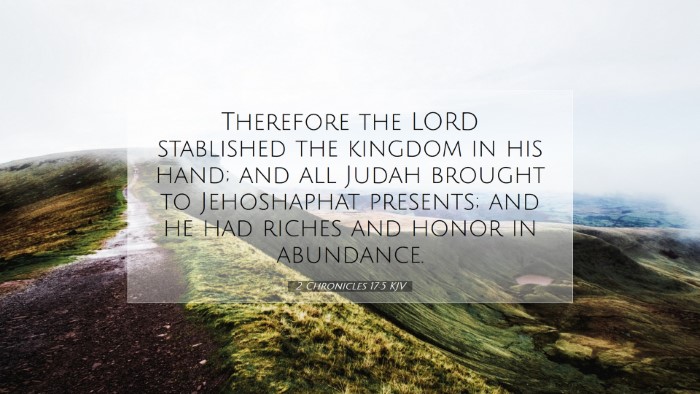Commentary on 2 Chronicles 17:5
2 Chronicles 17:5 states: "Therefore the Lord established the kingdom in his hand; and all Judah brought to Jehoshaphat presents; and he had riches and honor in abundance."
Introduction
This verse comes from a pivotal moment in the reign of Jehoshaphat, King of Judah. It encapsulates the divine favor that accompanied Jehoshaphat's leadership, illustrating the profound relationship between obedience to God and the resulting blessings in a leader’s life. The public domain commentaries from Matthew Henry, Albert Barnes, and Adam Clarke offer rich insights into the implications of this passage.
Divine Establishment of the Kingdom
Matthew Henry emphasizes that the Lord’s establishment of Jehoshaphat’s kingdom signifies God’s approval of Jehoshaphat's righteous leadership. The phrase "established the kingdom" indicates a firm foundation, suggesting that the stability of a kingdom is rooted in fidelity to God. Henry points out that the success experienced by Jehoshaphat is a direct result of seeking the Lord genuinely and removing idols from Judah.
Albert Barnes adds that the establishment of Jehoshaphat's throne amidst external threats reinforces the notion that spiritual integrity leads to temporal prosperity. God’s intervention ensures that righteousness prevails, allowing Judah to flourish. Barnes mentions how this historical context provides God's people assurance that divine favor is resultant of their obedience to divine decrees.
Material Blessings: Riches and Honor
The latter part of the verse indicates that "all Judah brought presents," signifying acknowledgment and tribute to their king. Adam Clarke interprets this act as more than mere material contributions; it symbolizes the loyalty and unity of Judah under a godly leader. Clarke notes that such material blessings, while significant, must be viewed within the broader context of spiritual obedience. The riches and honor bestowed upon Jehoshaphat are seen as a byproduct of his commitment to God’s ways.
Henry also mentions that these gifts reflect the people's gratefulness for the peace and prosperity they enjoyed under his reign. This underscores a principle that when leaders act in accordance with God's will, they tend to create a favorable environment that results in public support and earthly rewards.
Theological Implications
This passage presents significant theological insights regarding the relationship between God’s sovereignty and human responsibility. Barnes notes that while God's sovereignty is paramount in establishing Jehoshaphat's reign, human actions and decisions play a crucial role in eliciting divine favor. The duality of divine grace and human behavior is a recurring theme in the Scriptures, and this passage encapsulates it vividly.
Henry argues that the blessings of God are not random; they are closely tied to the faithfulness and the righteousness of the people and their leaders. The establishment of Jehoshaphat's reign serves as a case study for future leaders and believers, providing a clear model of how aligning with divine principles fosters a community blessed by God.
The Example of Jehoshaphat
Adam Clarke calls attention to the character of Jehoshaphat as an exemplary model for leaders. His active measures to root out idolatry and evil practices in Judah reflect a commitment to holiness, which is essential for effective leadership. Clarke highlights how the dignity and honor of Jehoshaphat were enhanced not only by material wealth but by a deep-seated respect accrued through his fidelity to God.
Henry further posits that Jehoshaphat’s reign can teach modern leaders about integrity. The respect he commands is directly linked to his dedication to the Lord, which in turn fosters a culture of reverence and cooperation among the people.
Applications for Today’s Leaders
This verse offers profound lessons for contemporary leaders in the church and society. Barnes emphasizes that the principles derived from Jehoshaphat's life are applicable to any leader who desires to govern effectively and righteously. The verse inspires leaders to pursue a relationship with God as the cornerstone of their leadership, asserting that spiritual health within a leader fosters organizational health within communities.
Clarke encourages pastors and spiritual leaders to examine their actions and motivations critically. This encourages active pursuit of God’s guidance in leadership decisions, underlining that spiritual integrity can lead to an abundance of blessings not just for the leader but for the entire community.
Henry concludes with a call to action for leaders, urging them to foster an environment where God’s principles are honored, thereby inviting divine blessings upon their endeavors. The illustration of Jehoshaphat remains a beacon for those who wish to lead with wisdom and strength anchored in faith.


